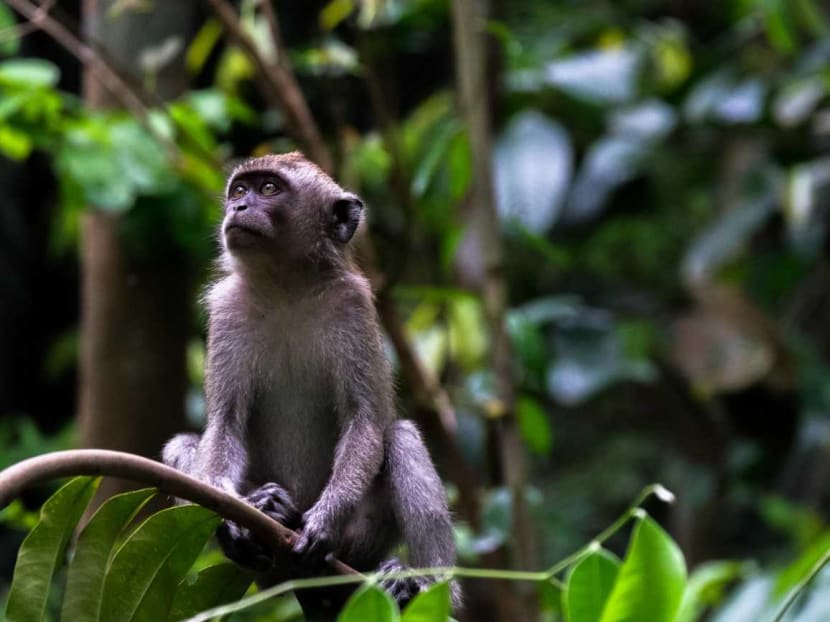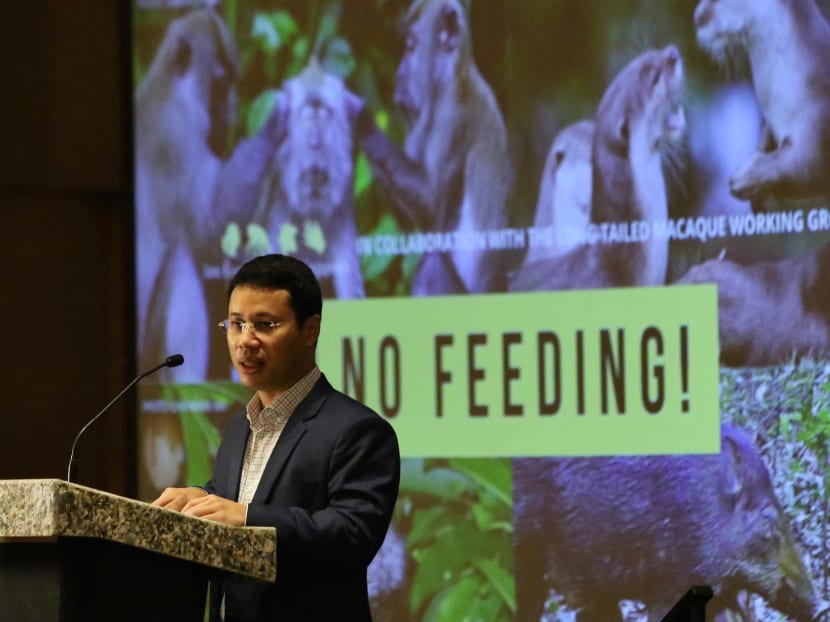New campaign urges residents to stop feeding macaques as part of effort to reduce human-wildlife conflict
SINGAPORE – A campaign was unveiled on Tuesday (Nov 26) to dissuade residents living in homes on the forest fringe from feeding long-tailed macaques.

In the three-year campaign, residents are being urged to resist the temptation to feed long-tailed macaques, as this could result in them raiding their homes for food.
SINGAPORE – A campaign was unveiled on Tuesday (Nov 26) to dissuade residents living in homes on the forest fringe from feeding long-tailed macaques.
Feeding the macaques — a type of wild monkey — alters their natural behaviour, making them dependent on humans and leading them to enter homes seeking food, Second Minister for National Development Desmond Lee said in announcing the three-year “no feeding” campaign.
Macaques, which prefer living on the forest fringe, have already been known to enter homes on occasions in search of food, Mr Lee said.
The campaign will be led by the Singapore chapter of the Jane Goodall Institute (JGI) — a global wildlife and environment conservation group — in tandem with the Long-Tailed Macaque Working Group, which consists of various interested organisations including JGI Singapore (JGIS).
Mr Lee made the announcement at the JGIS Human-Wildlife Co-existence in Asia Conference, attended by Dr Jane Goodall, a famous primatologist and anthropologist.
In his opening remarks at the conference Mr Lee, who is also the Minister for Social and Family Development, said the campaign aims to “reduce and eventually stop the provision of food to macaques by humans”.

Second Minister for National Development Desmond Lee announcing the "no feeding" campaign on Tuesday (Nov 26). Photo: Najeer Yusof/TODAY
While details of the campaign will be shared only “in the coming months, as the plans take shape”, he said the initiative will be supported by ramping up outreach and education activities.
Mr Lee said it was important to reduce conflict between wildlife and humans using a science-based approach, but also “community-centric solutions”.
'FEEDING IS WRONG DESPITE GOOD INTENTIONS'
Dr Andie Ang, the president of JGIS, said that people who feed animals usually do so with good intentions.
“But we need to tell them that it is wrong, and that they are actually harming the animals in the long-term,” said the primatologist, who also chairs the Raffles' Banded Langur Working Group.
Feeding the monkeys, or any wild animal, will only habituate them towards humans and associate them with food.
They will in turn be more likely to wander near or into homes in their search for something to eat, and increase the chance for conflict to occur between them and humans.
She said the focus of the campaign will be around nature parks or residential areas that are very close to the forest.
Aside from education, there will also be programmes to train residents living near the forest fringes on how to safely guide the monkeys back to the forest.
“In a way, it’s to create this invisible barrier where monkeys shouldn’t cross into people’s homes,” said Dr Ang.
She added that the campaign will also teach people how to keep their food waste properly.
With these actions in place, she said that over time, monkeys will learn not to cross into areas where humans live and work.
NEW STUDY
To help with the conservation and management strategies of the long-tailed macaques, Mr Lee said the National Parks Board (NParks) and the National University of Singapore (NUS) will embark on new primate study next year.
The three-year study, which will begin in January next year, will also study the interaction between the long-tailed macaque and the Raffles’ banded langur by comparing factors that include their diet, range and movement, and demographics.
NParks said knowing the type of food which the primates eat will allow the statutory board to plant more food sources for them in the forests.
It added that knowing the range and movement will “highlight the areas” where habitat connectivity can be improved, or mitigation measures can be taken to minimise human-wildlife interactions for the long-tailed macaques.
Dr Adrian Loo, NParks' conservation group director, said that preliminary data has shown that there is already sufficient food for the monkeys in the forest.
“It’s not very healthy for them to eat the junk food that people feed them with,” he added.
THE MONKEY GUARDS
Among the various types of wildlife found in Singapore, the long-tailed macaque remains the most common animal that people cross paths with.
Ms Sabrina Jabbar, the programme lead of JGIS’ Monkey Guards programme, explained that is because the monkeys live on the perimeters of forests located in the heartlands of Singapore.
She added that indirect feeding of the long-tailed macaques, such as religious food offerings from Chinese New Year or the Hungry Ghost Festival that are left out in the open, are also luring the primates away from the forests and into the homes of residents living near the forests.
Describing the macaques as “food opportunists”, Ms Jabbar said that by feeding the monkeys, they lose this “healthy fear” of humans.
Rather than culling the monkeys, which she says is an ineffective way to deal with the intrusions, JGIS' programme focuses on a non-violent method to keep them out.
Ms Jabbar ropes in residents, security guards and animal-loving volunteers to teach them how to patrol selected residential areas to recognise the alpha males that lead the various troops.
Once identified, people designated as “monkey guards” will use long-wooden sticks to safely guide the alpha monkey back to the forest. The rest of the troop will then follow suit.
Ultimately, she said that not all scenarios warrant a response. If the monkey is just passing by, for instance, she said people should just let it be.











